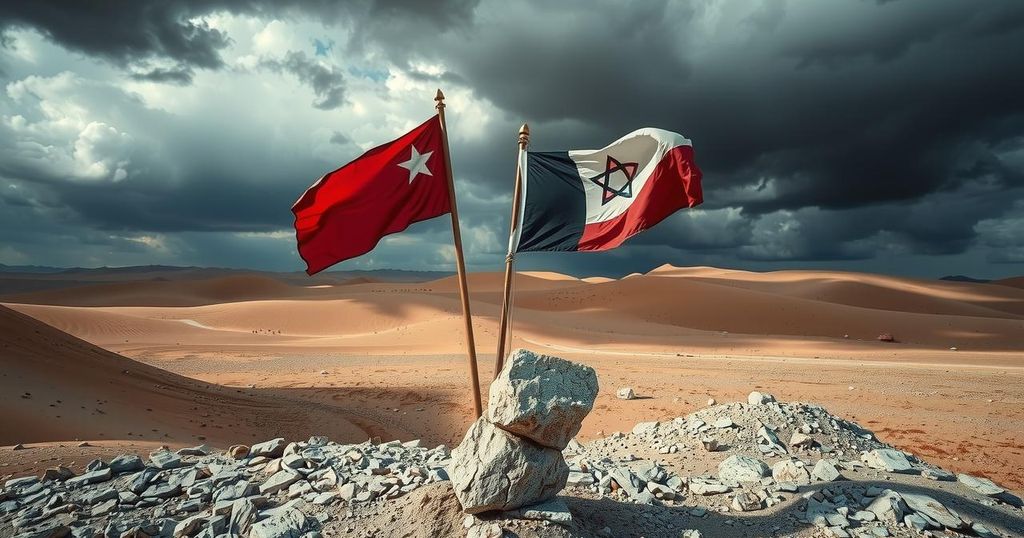The article reports on the Polisario Front’s military threats against Mauritania due to the latter’s plans to open a trade route with Morocco. The situation indicates Polisario’s frustration over Morocco’s economic partnerships with neighboring countries. Key developments include a significant road project and an electricity grid connection aimed at enhancing trade and cooperation between Mauritania and Morocco amidst regional tensions.
The Polisario Front has heightened tensions by issuing military threats against Mauritania, reacting to the latter’s decision to establish a new commercial border crossing with Morocco. This move is interpreted as an expression of the separatist group’s discontent with Morocco’s strengthened economic ties with its neighbor.
Calmness gives way to hostility as senior Polisario leader Bachir Mustapha Sayed warned of potential conflict if the crossing proceeds, asserting it would alter the Sahrawi borders. This rhetoric underscores the ongoing conflict’s volatility as Morocco approaches the completion of its strategic road linking Smara with Mauritania.
The anticipated roadway project, which aims to enhance trade between Morocco and Mauritania, follows a notable meeting between King Mohammed VI and Mauritania’s President Mohamed Ould Ghazouani in Casablanca. This meeting not only marked Ghazouani’s inaugural visit to Morocco since his inauguration but also fostered several cooperation initiatives, including an electricity grid connection.
With the grid connection, Mauritania seeks stable electricity supplies from Morocco, especially amid rising tensions in West Africa. Observers note that the Polisario’s threats underscore its increasing isolation as Morocco forges stronger economic bonds with regional partners.
The recent commercial crossing builds upon Morocco’s strategic movements in the region. Following the successful Guerguerat operation in 2020, which curtailed Polisario’s disruptive activities, the new crossing is set to be safeguarded through advanced drone surveillance against militant threats, thereby facilitating greater regional trade.
Meanwhile, Mauritania reassesses its economic partnerships, positioning Morocco as essential amidst instability in the Sahel. The alliance is particularly significant as Mali’s military regime faces economic challenges and is isolated due to security issues stemming from regional tensions.
Mauritania has demonstrated political neutrality on the Sahara issue while pursuing economic initiatives with Morocco, exemplified by participation in the Nigeria-Morocco gas pipeline project. This shift reflects a broader realignment amid concerns over existing debts from Mali affecting regional financial stability.
Additionally, Mauritania is distancing itself from Algeria, whose military actions have strained bilateral relations. Recent military enhancements in Mauritania’s northwest reflect the country’s commitment to safeguarding its territory against potential incursions from the Polisario Front and other threats.
The rise of Russian Wagner Group mercenaries near its borders adds further security concerns for Mauritania as civilian safety is jeopardized in light of recent kidnappings. This context demonstrates the numerous layers of relations and tensions within the region, necessitating vigilant security measures and strategic partnerships.
The article discusses the escalating tensions between the Polisario Front and Mauritania concerning the latter’s new trade route with Morocco. The Polisario Front, which advocates for the independence of Western Sahara, perceives this development as an infringement on its claims and issues threats in response. It reflects the broader regional dynamics where Morocco seeks to deepen its economic ties with Mauritania amid increasing geopolitical challenges, including concerns regarding Algeria and militant activities in the Sahel. The context of military and economic cooperation initiatives highlights the intricate relationships within West Africa, including the influence of foreign powers such as Russia.
In conclusion, the Polisario Front’s military threats against Mauritania signal rising tensions over a new trade route with Morocco, illustrating the complexities of regional politics in West Africa. As economic partnerships between Morocco and Mauritania strengthen, this challenges the Polisario’s position and highlights its growing isolation. The strategic developments around the new border crossing underscore the need for enhanced security measures and the significance of regional cooperation in an increasingly unstable area.
Original Source: www.moroccoworldnews.com






